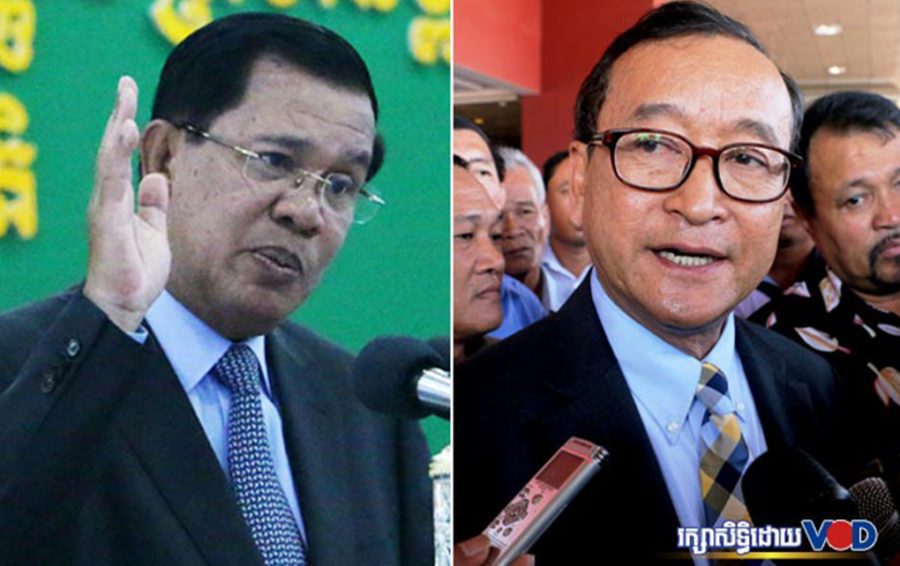For Prime Minister Hun Sen, external “harassment” from foreign states is jeopardizing peace in Cambodia and necessitating the suppression of what the government has called a “terrorist” opposition movement.
For several social and political observers, however, it’s the heightened rhetoric from both the ruling party and the dissolved opposition that is putting the country’s peace on uncertain ground.
After almost 30 detentions and more than 150 summonses of opposition Cambodia National Rescue Party (CNRP) members and supporters this year, politicians and analysts are drumming up debate over the dangers facing the country.
To mark World Peace Day on Saturday, Hun Sen issued an open letter accusing foreign powers of destabilizing his country.
“Cambodia’s peace has also been fragile due to threats, continued harassment and constant intervention in our internal affairs from the external environment, especially from some powers and Western powers,” Hun Sen said in the letter.
Earlier in the week, government spokesman Phay Siphan accused the U.S. of backing a “terrorist” movement led by exiled political leader Sam Rainsy.
Rainsy’s CNRP was dissolved in November 2017, two months after party president Kem Sokha was arrested for allegedly colluding with the U.S. to topple the government.
In 2013, Rainsy and Sokha had led the newly merged CNRP to near victory in a national vote following decades of Hun Sen’s rule.
Last year, however, the ruling Cambodian People’s Party (CPP) swept all 125 seats in the National Assembly — eight months after its rival, the CNRP, was dissolved by Supreme Court order at the government’s request.
Rainsy, who has been living abroad amid a slew of court convictions against him, has vowed to attempt a return to the country on November 9 while gathering a mass of public supporters to prevent his arrest, a promise that appears to have set off the government’s latest crackdown. The CNRP has also offered to provide funds for any defecting soldiers upon the opposition leaders’ return.
Social development researcher Pa Chanroeun said that although there was currently no war in Cambodia, there was no peace of mind for people in the country.
“Peace is not only the absence of war or conflict within your own nation or with its neighbors, but it also includes justice, hardships due to natural disasters, poverty, conflicts with neighbors, social freedom,” said Chanroeun, director of the Cambodian Centre for Applied Philosophy and Ethics.
“I can conclude that Cambodia is not yet at peace,” he said.
Yong Kim Eng, president of local NGO People Center for Development and Peace, said peace in Cambodia was at risk because politicians on both sides were keeping themselves busy creating conflicts with political rhetoric — without paying attention to the social issues affecting people.
“Politicians’ comments through the media are just political statements. The political statements are populist [attempts],” Kim Eng said, arguing that elsewhere in the world people did not put so much stock in their leaders’ words.
He added that the political bickering was getting in the way of Cambodians’ economic interests, with the E.U. currently mulling a suspension of duty-free trade preferences with Cambodia over labor and human rights concerns.
“The most important thing is that we try to solve it peacefully and think together about strategies to strengthen Cambodia’s economy,” he said.
Srun Srorn, president of Cam Asean Youth’s Future, said politics was dragging down the country’s peace toward a dangerous place, with politicians increasingly looking to foreign support — China on the one hand and the West on the other — rather than upholding laws.
“The likelihood of war is increasing more and more, and if these leaders don’t use the law as the focus for discussions — and instead brand the law as being useless — we will [end up] using power and military force to solve the crisis,” Srorn said.
Then Cambodia would witness real foreign interference, he said, “not only America and China.”
With Chinese investment in the country soaring, the government has increasingly looked to China for political support, canceling military exercises with the U.S. in favor of joint drills with China. As the U.S. and other nations denounced Cambodia’s 2018 election as flawed, China congratulated the country for a “smooth” vote.
According to a World Bank report from May, China’s $2.2 billion in approved investments into Cambodia in the first half of 2018 amounted to 93 percent of all foreign direct investment during that period.
Srorn, nevertheless, held that the current political tensions could be resolved with public pressure on the country’s leaders to return to the negotiating table — in particular by insisting that they put their personal issues aside in the interests of the country.
“If people can separate [those two levels of] the dispute, then the negotiations between political parties, and forgiveness between political parties, will happen automatically. For me, I still think that the people are the ones who can bring about negotiations in the near future.”
(Translated and edited from the original article on VOD Khmer)












